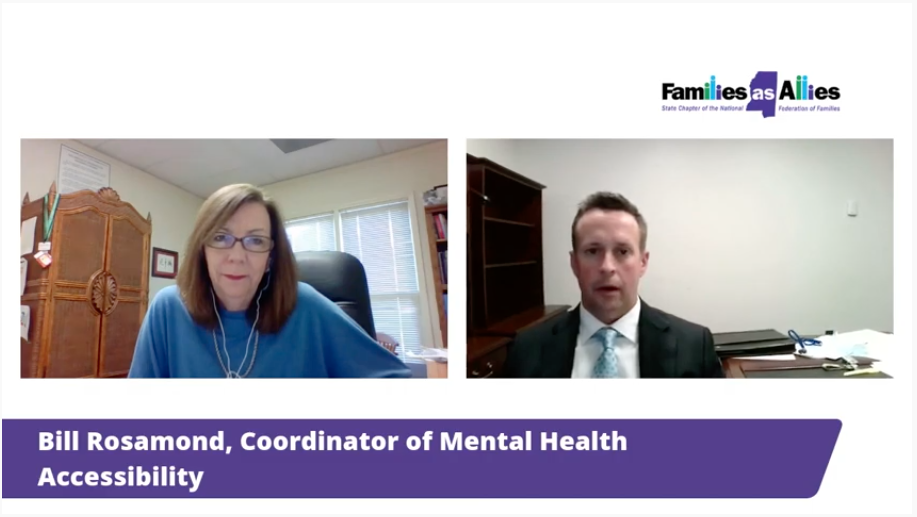The Mississippi Legislature created the Coordinator of Mental Health Accessibility position in 2020, tasked with these duties:
- To perform a comprehensive review of Mississippi’s mental health system.
- To analyze and review the structure of the mental health system.
- To review the adequacy and quality of the individualized supports and services provided to people discharged from the state hospitals.
- To review the quarterly financial statements and status reports of the individual community mental health centers.
- To consult with the Special Master appointed in the United States of America v. Mississippi and a wide range of other stakeholders, including the Monitor in the same lawsuit.
- To determine where the delivery or availability of mental health services is inadequate in any county or geographic area within a county.
- To determine whether each community mental health center has sufficient funds to provide the required mental health services.
- To report on the status of the mental health system quarterly.
Bill Rosamond was appointed to the Coordinator position on October 15, 2020. His office released its second quarterly report in December 2021.
The report focuses on Region 11’s Community Mental Health Center: Southwest Mississippi Mental Health Center. Region 11 serves these counties: Adams, Amite, Claiborne, Franklin, Jefferson, Lawrence, Pike, Walthall and Wilkinson.
Region 11 was chosen due to its financial vulnerability. The center was unable to provide recent income statements, and its collections for January through August 2021 were less than its payroll. It is behind in its payments into the state’s employee retirement system and has possible debts totaling $570,000.
The report does not speculate on what led to this financial picture but concludes that the center does not have adequate funds to operate responsively and effectively. The report does not mention if the center has received any support or technical assistance from the Department of Mental Health (DMH), who certifies the center, to address these issues. It is also unclear if the DMH has addressed the center’s problems through monitoring, other than a letter from DMH Executive Director Wendy Bailey regarding Region 11’s Crisis Stabilization Unit.
The report gives three broad areas of recommendations:
- Continuation of operations for Region 11 should be prioritized until long-term solutions can be assessed, selected and implemented. Region 11 should submit a Plan of Correction to DMH for its children’s day treatment services and adult psychosocial rehabilitation services; neither is fully operational. Region 11 should explore all possible areas of grant funding.
- Each community mental health center should prioritize educating people receiving services and those likely to be working with them about available mental health services and how to access them.
- The minutes of community mental health center commission meetings and information about services and how to access them should be available on community mental health center websites.
Families as Allies gave feedback to Mr. Rosamond’s office about these needs we believe were identified in his report:
To get information directly from people receiving services and their families, including people who no longer access services. We stressed that there should never be any discussion about people without them.
To determine why these fiscal issues occurred and clarify the role and responsibilities of the DMH as the certifying entity.
To examine Medicaid claims data for patterns and determine if the CMHCs have the information and support they need to maximize Medicaid appropriately. We also stressed the need for infrastructure to coordinate between the mental health system and Medicaid.
To correct the misconception that CMHCs are the only entities that can become CCBHCs.
To rename the “best practices committee” to the “fiscal sustainability committee” to more accurately communicate its purpose and area of subject matter expertise.
To make sure the best practices committee includes people receiving services and their families and considers adding at least one person from the Division of Medicaid.
To assess if people have attempted to access the mental health system and haven’t found it responsive and what this implies for system change.
To include other entities that provide mental health care in evaluating the CMHC regions and examine how those groups could help address the problems identified in this and future reports.
We appreciate that Mr. Rosamond took the time to visit with us in person in December. We look forward to ongoing conversations with him and his office, especially since the authorizing statute lists “mental health advocates, community leaders and any other necessary parties or entities” (line 158) as some of the parties the coordinator can consult with to assess the system.
During our meeting with Mr. Rosamond, we discussed the potential of Certified Community Behavioral Health Centers and that any exploration of them must include an open, competitive application process. We also discussed issues in evaluating children’s services, such as coordination between school-based mental health services and exceptional education and wraparound as the care coordination model in Mississippi state law.
If you have questions or feedback about this report or anything else for the Office of the Coordinator of Mental Health Accessibility, you can email Bill Rosamond at bill.rosamond@dfa.ms.gov or Steven Allen at Steven.allen@dfa.ms.gov.

